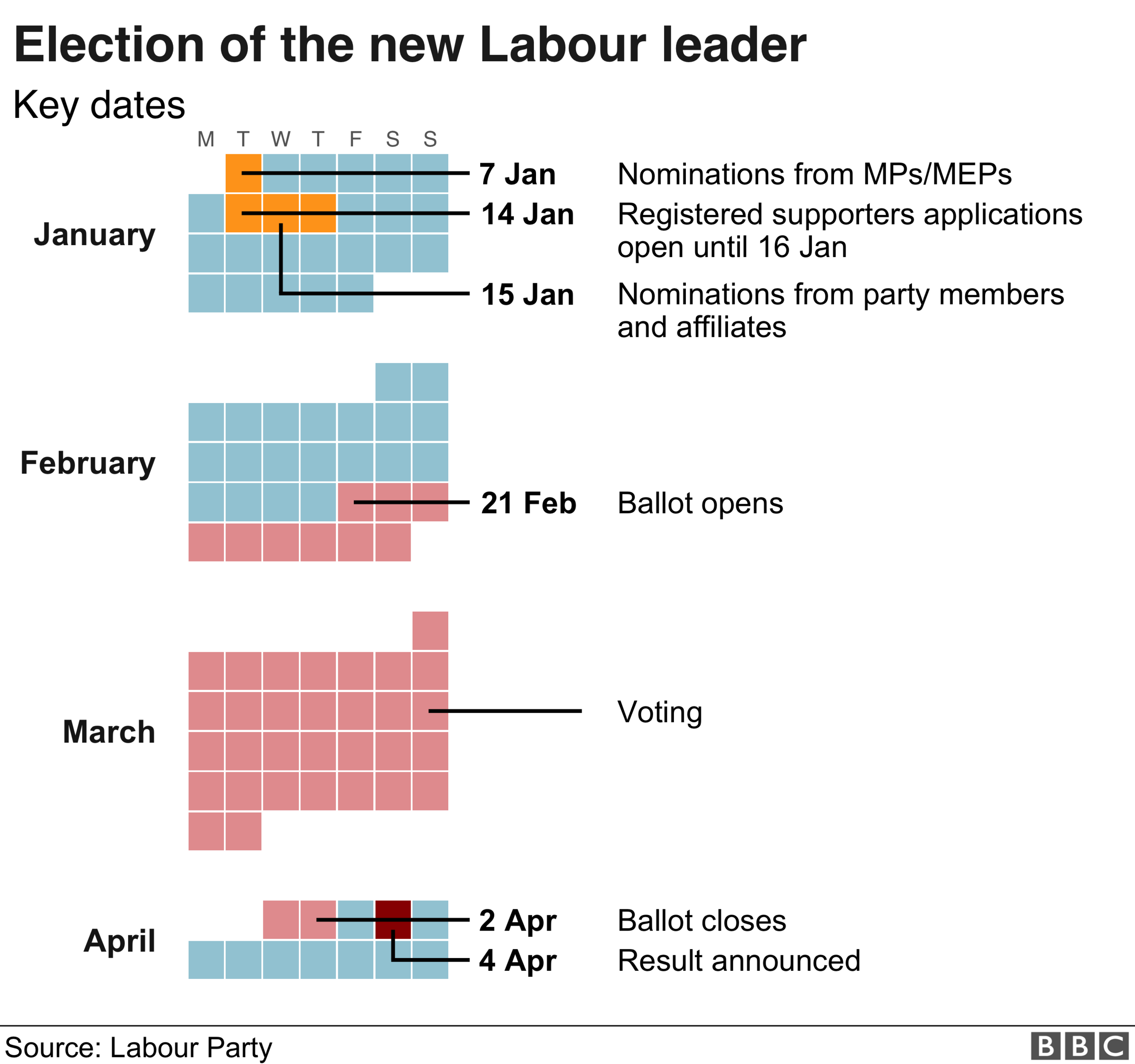Labour leadership: Starmer and Long-Bailey challenged over electability
- Published
Sir Keir Starmer is asked about his pitch to be the next leader of the Labour Party.
Sir Keir Starmer and Rebecca Long-Bailey have been challenged about their electability and leadership skills in BBC interviews with Andrew Neil.
Asked whether he had the charisma to transform Labour's fortunes, Sir Keir said there were "different ways to inspire people" and his "unrelenting" mission was to return Labour to power.
Mrs Long-Bailey said she had the "big ideas" needed to win the next election.
The pair also were also quizzed on donations and action on anti-Semitism.
In separate interviews broadcast on the Andrew Neil show, both the Labour leadership contenders committed to retain key policies from the party's 2019 manifesto despite its overwhelming defeat.
The third contender for the Labour crown, Lisa Nandy, was grilled by Andrew Neil last month.
Sir Keir, Mrs Long-Bailey and Ms Nandy are vying to succeed Jeremy Corbyn as leader, with the result to be announced on 4 April.
In his interview, Sir Keir said if he won his "unrelenting" focus would be returning Labour to government at the next election, expected in 2024.
Asked if he had the "fire in his belly" needed to galvanise Labour after its worst electoral performance, in terms of seats won, since 1935, Sir Keir suggested his leadership style would be different from Mr Corbyn's.
Rebecca Long-Bailey is asked what she would do differently as leader
"There are different ways to inspire people. You can inspire people so they want to sit at your feet listening to your next word. That is not me.
"Or you can inspire people by building a team of people who want to come with you on a journey and change their party and their country. That is what I am building in my campaign."


Keir Starmer acknowledged that, at the general election, the question of Jeremy Corbyn's leadership was the number one issue in many areas.
But despite repeated invitations to say something critical of Mr Corbyn, he stuck to his message of "unity".
Although suspected by some on the left of intending to move the party to the centre, he has gone out of his way to reassure the sizeable left-wing slice of the selectorate that he won't "over-steer" to the right.
So much so that tonight he described the nationalisation of water, mail, and rail as "baseline indicators" of where he wants to go.
And he went further than his pledge to repeal recent trade union laws. He now declared he'd get rid of all union legislation "that prohibited collective action".
So in appealing to party members, he is trying to ensure he can't be "out-lefted" by Rebecca Long-Bailey.
Polls suggest she is in second place. Although she is backed by left-wing grassroots group Momentum, she appeared to be trying to broaden her base.
She insisted there was "no such thing as Corbynism", and that she is "not a continuity of Jeremy Corbyn".
While she was 'proud' of the party's policies, she insisted they were "not left-wing" nor as "radical" as people had thought, stressing that the party needed to talk about "aspiration".
There haven't been many surprises in this contest. But the respective rhetoric adopted by the apparent frontrunners might have raised some eyebrows, not least among some of their own supporters.

Defending his continued backing for the free movement of people to and from Europe after Brexit, Sir Keir told Andrew Neil the views of Labour voters in the party's traditional heartlands on immigration were more nuanced than "soundbites" suggested.
He dismissed suggestions, levelled by some of Mrs Long-Bailey's supporters, that he was "hiding" details of his campaign's financial backers, saying he had received support from trade unions, crowd-funding and individual donations.
He insisted he was complying with the rules set out by the party before the contest started, saying the largest donation he had received so far - a £100,000 cheque from fellow barrister Robert Latham - had been declared in the MPs register of financial interests.

"The Labour rules say 'carry out the checks you have to carry out' and once you are satisfied that the donations are proper and in order, they go to the parliamentary authorities who put them on the parliamentary website so everyone can see them," he said.
"I have been following those procedures. How can you say I am hiding behind the process when it is the Labour Party process."
Mrs Long-Bailey, who has declared more than £300,000 in donations from the Unite union and left-wing campaign group Momentum, urged her rival to be open about the source of his donations and put "more meat on the bone" about the direction he would take the party in.
She defended her record, while a member of Jeremy Corbyn's shadow cabinet, of condemning anti-Semitism, rejecting suggestions she remained silent during a 2018 discussion on whether the party should adopt the international definition of anti-Semitism in full.
But she conceded she had not always "been quick enough" to call out examples of anti-Semitism, including at a recent campaign event when a member of the public accused prominent Labour politicians, including Jewish MP Margaret Hodge of "being part of the Israeli lobby".
"I should have challenged that specific element of that gentleman's contribution directly and I wish I had done that because it was an anti-Semitic statement," she said, adding that those guilty of "clear" examples of anti-Jewish prejudice should be expelled.
During an interview earlier in the campaign, the other candidate Lisa Nandy is asked for her views on university tuition fees, Royal Mail renationalisation, Trident, the NHS using private providers and the top rate of tax.